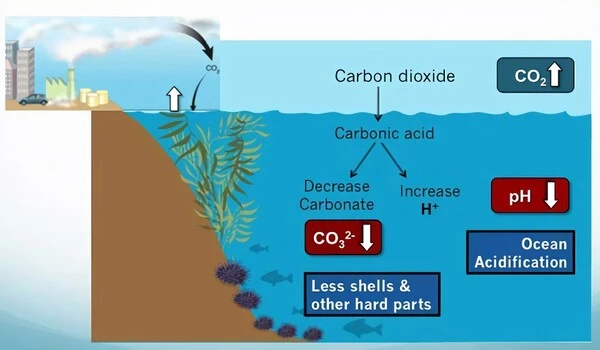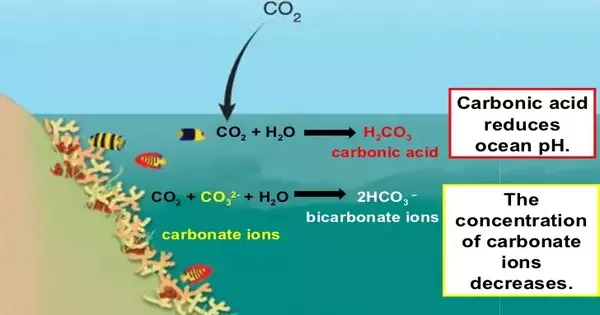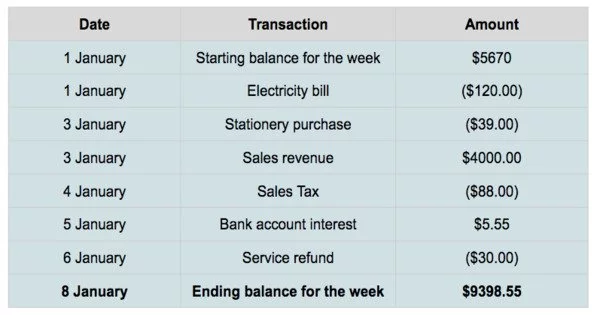Preparing for ocean acidification necessitates a multifaceted approach that combines scientific knowledge, policy development, community engagement, and adaptation strategies. An international research team creates a framework for governments and policymakers to assess their readiness for ocean acidification.
An international research team composed of scientists affiliated with more than a dozen institutions, including the California Academy of Sciences, propose a first-of-its-kind framework for governments around the world to evaluate their preparedness for – and guide future policies to address – ocean acidification, one of the most serious threats to marine ecosystems, in a paper published today in the journal Environmental Research Letters.
“Ocean acidification is one of climate change’s silent killers,” says Rebecca Albright, PhD, Academy Curator of Invertebrate Zoology and co-founder of the Coral Regeneration Lab (CoRL). “While not as visible as threats like coral bleaching, ocean acidification will cause widespread destruction of marine environments by the end of this decade if we do not take immediate action.” To assist policymakers in determining what actions to take, my collaborators and I asked ourselves, ‘What would a government have to do in order to have a comprehensive plan to safeguard both the environment and society from ocean acidification?'”
Ocean acidification is not an isolated issue, but rather one that is closely linked to other anthropogenic hazards – in Australia and elsewhere – such as warming, sea level rise, oxygen loss, and eutrophication.
Ove Hoegh-Guldberg
Ultimately, the researchers identified six aspects of effective ocean acidification policy, along with specific indicators for each, that policymaking bodies, from local governments to federal agencies, can use to evaluate and guide their own policies.
- Climate protection measures: Are there adequate policies to reduce overall emissions of the greenhouse gases driving ocean acidification?
- Ocean acidification literacy: Is there general public awareness and understanding of the threats posed by ocean acidification?
- Area-based management: Do marine protected areas and management plans include explicit strategies to measure and increase resilience to ocean acidification?
- Research and development: Are funds being explicitly invested in research dedicated to understanding and addressing ocean acidification?
- Adaptive capacity of dependent sectors: Is there an understanding of how ocean acidification will impact various political and socioeconomic sectors, including vulnerable communities, as well as mitigation strategies?
- Policy coherence: Overall, are policies consistent with evidence-based, science-backed efforts to address climate change and ocean acidification?
As a case study, the researchers used the framework to evaluate the current state of ocean acidification preparedness in Australia which is home to the world’s largest system of coral reefs, vibrant ecosystems that support the livelihoods of more than a billion people worldwide but are uniquely susceptible to acidification.

They found that while Australia is generally well prepared with a deep understanding of the adaptive capacity of vulnerable socioeconomic sectors and management strategies that explicitly address ocean acidification, the country is lacking in policy coherence and broader climate protection measures which may hinder its ability to lower greenhouse gas emissions which are the main contributor to ocean acidification.
“Ocean acidification is not an isolated issue, but rather one that is closely linked to other anthropogenic hazards – in Australia and elsewhere – such as warming, sea level rise, oxygen loss, and eutrophication,” says Ove Hoegh-Guldberg, PhD, of the University of Queensland. “As a result, any policy aimed at addressing ocean acidification, whether locally or globally, must take into account the many interconnected factors and their effects on both ecosystems and society.”
The researchers say their framework will enable researchers, conservationists, and governing bodies at all levels to identify areas for investment or collaboration to ensure their environments and societies are better protected by providing a baseline for countries to assess their preparedness for ocean acidification.
“After governments self-assess their readiness for ocean acidification, they’ll have a better sense of where gaps may exist,” says Sarah Cooley, PhD, Director of Climate Science at the Ocean Conservancy. “Gaps will be different for each government; some governments may need to increase fundamental research just to understand how their marine systems will respond to acidification, while others may need to increase adaptation to protect people and ecosystems most vulnerable to acidification.” This self-test will assist governments in focusing future efforts to ensure that they are emphasizing the most important areas for them and can take the necessary steps to address the most serious acidification threats.”
















